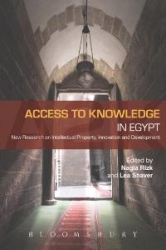
Author : Nagla Rizk
Publishing Date : Apr 29, 2014
This book is an important contribution to recovering a nuanced, contextually aware view of access to knowledge and global knowledge governance Yochaie Benkler, Harvard Law School
This is a 'must read' for scholars and practioners interested in economic devlopment, cultural production and access to knowledge Susan Sell, George Washington University
This volume features five chapters on current issues facing intellectual property, innovation and development policy from the Egyptian perspective. These include: information and communications technology for development, copyright and comparative business models in music, free and open source software, patent reform and access to medicines, and the role of the Egyptian government in promoting access to knowledge internationally and domestically.
Together these chapters offer an overview of the challenges and opportunities facing efforts to promote access to knowledge. Combining both theoretical and pragmatic approaches, the work will be of interest to scholars and practitioners dealing with intellectual property and innovation property the world over.
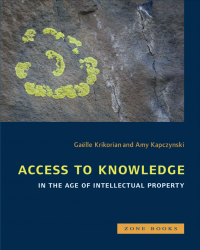
Author : Krikorian, Gaëlle; Kapczynski, Amy
Publishing Date : Mar 20, 2023
A movement emerges to challenge the tightening of intellectual property law around the world.At the end of the twentieth century, intellectual property rights collided with everyday life. Expansive copyright laws and digital rights management technologies sought to shut down new forms of copying and remixing made possible by the Internet. International laws expanding patent rights threatened the lives of millions of people around the world living with HIV/AIDS by limiting their access to cheap generic medicines. For decades, governments have tightened the grip of intellectual property law at the bidding of information industries; but recently, groups have emerged around the world to challenge this wave of enclosure with a new counter-politics of “access to knowledge” or “A2K.” They include software programmers who took to the streets to defeat software patents in Europe, AIDS activists who forced multinational pharmaceutical companies to permit copies of their medicines to be sold in poor countries, subsistence farmers defending their rights to food security or access to agricultural biotechnology, and college students who created a new “free culture” movement to defend the digital commons. Access to Knowledge in the Age of Intellectual Property maps this emerging field of activism as a series of historical moments, strategies, and concepts. It gathers some of the most important thinkers and advocates in the field to make the stakes and strategies at play in this new domain visible and the terms of intellectual property law intelligible in their political implications around the world. A Creative Commons edition of this work will be freely available online.

Author : Correa, Carlos M., Hilty, Reto M.
Publishing Date : Mar 20, 2023
This open access book is the outcome of a Global Forum on Innovation, Intellectual Property and Access to Medicines held in December 2019 at the Max Plank Instititute in Munich, organised by the South Centre and the Max Plank Institute. The academics and experts from international organisations participating have contributed chapters to this book. The book is for policy makers (in Ministries of Health, Ministries of Trade, Ministries of Foreign Affairs, patent offices), but also relevant for academics (law, trade, public health), on the flexibilities available in the Agreement on Trade Related Aspects of Intellectual Property Rights (TRIPS) of the World Trade Organization to promote access to medicines.
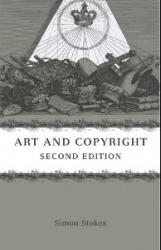
Author : Simon Stokes
Publishing Date : Sep 25, 2014
The intellectual property protection afforded to works of art is receiving increased attention by artists, museums, galleries, auction houses, publishers and their professional staff and legal advisors, as well as by those teaching or studying copyright and/or the law of cultural property.
Contemporary artists are pushing copyright law to extremes. The European Union is likely to soon formally adopt an artists’ resale right (droit de suite) directive. The recent adoption of the digital copyright directive will also further strengthen the rights of artists as regards the exploitation of their works via the Internet.
This is the first text to specifically examine in detail the intellectual property rights protecting artistic works and artists’ rights generally in the United Kingdom. The focus is on the UK but where appropriate other relevant jurisdictions are discussed. Recent European developments and the evolving UK case law in this area including the recent House of Lords’ decision in Designers Guild v Russell Williams are also addressed. The Internet and related intellectual property rights to copyright and moral rights are considered as well, including the law of passing off, breach of confidence, trade marks and domain name protection.
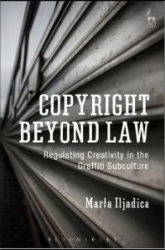
Author : Marta Iljadica
Publishing Date : Nov 25, 2016
The form of graffiti writing on trains and walls is not accidental. Nor is its absence on cars and houses. Employing a particular style of letters, choosing which walls and trains to write on, copying another writer, altering or destroying another writer’s work: these acts are regulated within the graffiti subculture. Copyright Beyond Law presents findings from empirical research undertaken into the graffiti subculture to show that graffiti writers informally regulate their creativity through a system of norms that are remarkably similar to copyright.
The ‘graffiti rules’ and their copyright law parallels include: the requirement of writing letters (subject matter) and appropriate placement (public policy and morality exceptions for copyright subsistence and the enforcement of copyright), originality and the prohibition of copying (originality and infringement by reproduction), and the prohibition of damage to another writer’s works (the moral right of integrity). The intersection between the ‘graffiti rules’ and copyright law sheds light on the creation of subculture-specific commons and the limits of copyright law in incentivising and regulating the production and location of creativity.
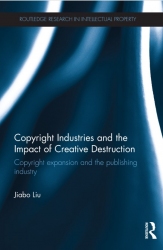
Author : Jiabo Liu
Publishing Date : Dec 12, 2012
This book examines the relationship between the legal extension of copyright duration as an enduring means of copyright protection and the growth of the UK book publishing industry as a typical creative industry reliant on copyright. The book draws on Schumpeter’s theory of creative destruction to analyse the implications of copyright law and policy on the book industry and illustrate the dynamic interaction between copyright expansion and the growth of the creative industries. The book reviews the historical development of UK copyright expansion and also considers copyright in the digital age. It explores the legal and economic concerns about copyright protection in general, and the expansion of copyright duration in particular. Using an innovative empirical method, it explores whether the expansion of the duration of copyright promotes or precludes the growth of book publishing industry. It goes on to suggest changes to copyright policy which would have an impact on the economics of innovation in the creative industries.
This book will be of particular interst to scholars and students of Intellectual Property Law.
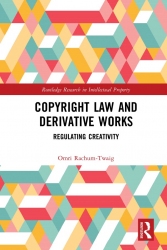
Author : Omri Rachum-Twaig
Publishing Date : Oct 26, 2018
Copyright law regulates creativity. It affects the way people create works of authorship ex-ante and affects the status of works of authorship significantly ex-post. But does copyright law really understand creativity? Should legal theories alone inform our regulation of the creative process?
This book views copyright law as a law of creativity. It asks whether copyright law understands authorship as other creativity studies fields do. It considers whether copyright law should incorporate non-legal theories, and if so, how it should be adjusted in their light. For this purpose, the book focuses on one of the many rights that copyright law regulates – the right to make a derivative work. A work is considered derivative when it is based on one or more preexisting works. Today, the owner of a work of authorship has the exclusive right to make derivative works based on her original work or to allow others to do so. The book suggests a new way to think about both the right, the tension, and copyright law at large. It proposes relying on non-legal fields like cognitive psychology and genre theories, and offers new legal-theoretical justifications for the right to make derivative works.
As the first book to consider the intersection between copyright law, creativity and derivative works, this will be a valuable resource for students, scholars, and practitioners interested in intellectual property and copyright law.
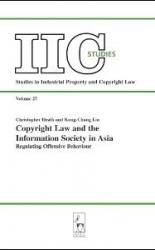
Author : Christopher Heath and Kung-Chung Liu (eds)
Publishing Date : Jul 25, 2017
The book takes a look at the six most important current topics arising from copyright law in the information society, and for each topic provides an in-depth introduction that compares the approaches taken in Europe and the US. Each topic is introduced by an expert, and the issues are then analysed in separate country reports representing nine Asian jurisdictions: China, Taiwan, Hong Kong, Japan, Korea, Singapore, Malaysia, Thailand and the Philippines.
The six topics are:
The Expansion of Copyright Law and its Social Justification: Introduction by Reto Hilty, Max Planck Institute, Munich
Internet Trade, Digital Works and Parallel Imports: Introduction by Christopher Heath, European Patent Office, Munich
The Collective Exercise of Copyrights: Introduction by Kung Chung Liu, Academia Sinica, Taiwan
The Law on Anti-Circumvention and Digital Rights Management: Introduction by Andy Sun, National Chenchi University, Taipei, Taiwan and Zhi Wei, Peking University, Beijing
Copyright Contracts, Public Policy and Antitrust: Introduction by Estelle Derclaye, Queen Mary University of London
Contributory and Vicarious Liability for Copyright Infringement: Introduction by Andy Sun, National Chenchi University, Taipei, Taiwan
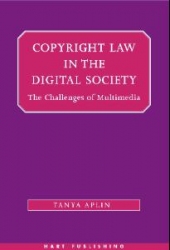
Author : Tanya Aplin
Publishing Date : Sep 10, 2014
examines the extent to which copyright and database right protect multimedia works. It does so from the perspective of UK law, but with due attention being paid to EU law, international treaties and comparative developments in other jurisdictions, such as Australia and the U.S. The central argument of the book is that the copyright and database right regimes are, for the most part, flexible enough to meet the challenges presented by multimedia. As a result, it is neither necessary nor desirable to introduce separate copyright protection or sui generis protection for multimedia works.
This important and original new work will be essential reading for any lawyer engaged in advising on IP matters relating to the new media industries, and scholars and students working in intellectual property and computer law.
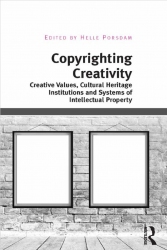
Author : Helle Porsdam
Publishing Date : Mar 09, 2016
What is the relationship between creativity, cultural heritage institutions and copyright? Who owns culture and cultural heritage? The digital age has expanded the horizon of creative possibilities for artists and cultural institutions - what is the impact on legal regimes that were constructed for an analogue world? What are the tensions between the safeguarding of cultural heritage and the dissemination of knowledge about culture? Inspired by a three year research project involving leading European universities, this book explores the relationship between copyright and intellectual property, creativity and innovation, and cultural heritage institutions. Its contributors are scholars from both the humanities and the social sciences - from cultural studies to law - as well as cultural practitioners and representatives from cultural heritage institutions. They all share an interest in the contribution of intellectual property to the role of cultural institutions in making culture accessible and encouraging new creativity.

Author : Simon Stokes
Publishing Date : Mar 06, 2015
The first edition of this book in 2002 was the first UK text to examine digital copyright together with related areas such as performers' rights, moral rights, database rights and competition law as a subject in its own right. Updated editions have included the UK implementation of the 2001 Information Society Directive and commentary on user-generated content and the development of Web 2.0 and beyond. Now in its fourth edition, the book has been updated and revised to take account of legal and policy developments in copyright law and related areas, in particular the increasing role of the Court of Justice of the European Union in shaping EU copyright law. The book helps put digital copyright law and policy into perspective and provides practical guidance for those creating or exploiting digital content or technology, whether in academia, the software, information, publishing and creative industries, and other areas of the economy. The focus is on the specifics of the law in this area together with practical aspects, including precedents and precedent checklists dealing with common digital copyright transactions. The latest edition has been expanded to include a discussion of Open Access, eBooks and app development and licensing. Both academics and practitioners will find the book an invaluable guide to this rapidly developing field of law.
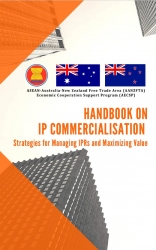
Author : The ASEAN Secretariat
Publishing Date : Mar 12, 2020
This Handbook is designed for business people of ASEAN Member States, Australia and New
Zealand.
In aid of understanding, some examples have been provided, but these are mere illustrations and do
not provide judgment and do not constitute commercial or legal advice. Views or conclusions may
have also been expressed but these should NOT be taken as legal or commercial advice. Any part of
the content of this publication (including images, graphics, trademarks or logos) is only intended for
informational and educational and educational purpose only.
The author and the ASEAN Secretariat have taken due diligence in the preparation of this
publication. However, they shall not be held liable for any omissions or inaccuracies in the content of
this publication. Neither the authors, the ASEAN Secretariat, Australian and New Zealand
Governments accept any liability for any claims, loss or expenses that may arise or arising from use
123NextLast
